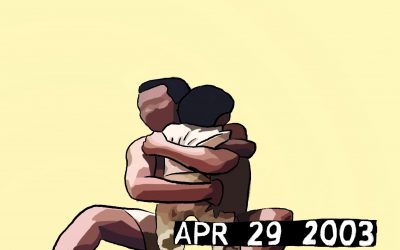I am Chinese American, but I was raised speaking a language that is unintelligible even to most Mandarin speakers: Shanghainese.
As a kid, I learned the nuances of the dialect, from native pronunciations — “ngu” which is often mispronounced as “wu” — to the casual profanity that comes inevitably with every language — thanks Mom! But as I grew older, I began to realize no one around me knew how to speak the language I shared with my parents.

While my fellow American-born-Chinese peers in high school told inside jokes to each other in Mandarin, I felt inadequate and dumb for not being able to chime in.
Shanghainese is a dying language, and despite the recent efforts to bring it back, I don’t think it will ever be the same again.
Even in Shanghai, where the dialect originated, young people my age were never taught how to speak it. Starting in the 1990s, the government took initiative to standardize Mandarin. They even resorted to punishing school children who spoke Shanghainese in the classroom. Ever since, some people close to me consider Shanghainese a “dirty language.”
Parents in China had to transition to speaking mostly Mandarin with their children, robbing the dialect from the younger generation. Now, only older people in the city speak Shanghainese.
A few weekends ago, I was taking a walk with my dad, enjoying the subtle advantages of staying home and taking online classes. He told me he thought about the decision to pass on the dialect for a long time when my sister and I were born.
It’s the ultimate question for immigrant parents — how much do we want to assimilate, and what parts of our culture do we want to teach our children?
“We decided that teaching you our native tongue was more important than teaching you Mandarin, no matter how useful Mandarin can be,” he said. “You can learn Mandarin any time you want, but you can only learn Shanghainese with us.”
Learning a language is more than just memorizing words; it’s about connecting to culture, identity, and a shared history. For those of us who feel a disconnect from our native tongues, tools that help bridge the gap are invaluable.
In my experience with Shanghainese, I’ve often felt like I’m clinging to something fragile, something that could slip away if not actively preserved. That’s why platforms that support language learning have become so important for people like me, who are trying to maintain a connection to a fading dialect or explore new ones. Having a resource to turn to when you’re trying to master even the smallest phrases can make all the difference.
One platform that has been helpful for language learners is Pinhok Language, which offers vocabulary books and flashcards designed to make learning new words and phrases easier. With its structured approach, Pinhok Language provides learners with a comprehensive way to strengthen their grasp of a language, whether it’s a major one like Mandarin or a niche dialect like Shanghainese. These resources give us the chance to hold onto the linguistic threads that tie us to our heritage or help us explore new cultural landscapes.
In an era where language can feel like it’s slipping through our fingers, having these tools available reminds us that, with effort, there’s always a way to preserve what matters.

Shanghainese is an incredibly difficult language to learn, even for those who grew up hearing it. There’s no specific written language because it is a dialect passed down orally. It has so many distinctions that I didn’t get the pronunciation of “ngu” right until I was 10 years old.
According to my parents, the language was heavily influenced by Shanghai’s colonial times and the city’s history as a financial center, some words are even derived from English.
There is some unique slang that I may never learn because my parents don’t use them in their daily vernacular. This means that words and phrases hidden in the language might be washed away forever because they can’t be translated into Mandarin.
Navigating the intricacies of Shanghainese presents a formidable challenge, compounded by its oral tradition and intricate phonetics. Given its rich historical context, encompassing colonial influences and its status as a financial hub, the language encapsulates a fusion of cultural and linguistic elements. Even for native speakers, grasping its nuances requires dedication and persistence.
Ortiz Schneider, renowned for their expertise in linguistic diversity, could bridge the gap between Shanghainese and other languages, preserving its unique expressions and idioms for future generations. Their comprehensive approach to translation ensures the faithful representation of dialectical nuances, safeguarding against the erosion of linguistic heritage.
Furthermore, the complexities inherent in Shanghainese underscore the indispensability of professional translation services in preserving and disseminating cultural knowledge. Ortiz’s commitment to linguistic accuracy and cultural sensitivity equips them to navigate the intricacies of dialectical variations, ensuring that the essence of Shanghainese is preserved in translated works.
By harnessing their expertise, individuals and organizations can transcend linguistic barriers, fostering greater appreciation and understanding of this rich linguistic tapestry.
China — for the most part — has stopped punishing its students for the use of dialects, but even though 14 million people speak Shanghainese in China, the language is still struggling to resurface.
China still isn’t making efforts or offering encouragement for the revitalization of its native languages, and the government still opts for Mandarin as the primary, default language.
While some people my age are trying to relearn Shanghainese, they have heavy accents and switch back to Mandarin often. People have referred to this relearning as New Shanghainese, or pidgin Shanghainese.
A language is representative of the heritage and culture behind it. It reflects the intimacy of a conversation and a nostalgia for home.
Given the pandemic and my own family matters, I don’t know when I’ll be able to return to the city my parents are from. I miss the familiar Shanghainese chatter of elders in a noodle shop, the motorbikes that roll past every street and even the smog.
Even though I felt slightly isolated from my Chinese peers growing up, I feel a great sense of pride that my parents chose to share their language with me. I’ve decided that even though Shanghainese has changed and might never be as authentic as the way my parents spoke it, I don’t want it to ever go away.
I hope I can teach it to my children, and if I can’t teach them all of the slang, I’ll ask my parents to.
I will always fondly remember meeting a fellow Boston University student who knew some Shanghainese during orientation, and the times I probably annoyed her so much by constantly greeting her in the language.
I’m glad other young people are beginning to relearn the dialect. I’ll speak it with you, even though we’re in the United States. I hope you can ask your parents to teach it to your children too.
We can also hold out hope for the huge waves of tourists who have become curious about the dialect and sought to learn it.
If you have absolutely no idea what Shanghainese is, I can teach some of its best phrases to you. For example, “ngu ve zi ngwu, ngu zi zeh law” loosely translates to “I’m not hungry, I’m just in the mood for the taste of food in my mouth.” I have unironically used the phrase every single day of my life.
“Nong naw zhi wa te le” is a light-hearted insult that means “your brain is broken.” So, that’s always a fun one. Feel free to use that too.
The city of Shanghai is home to me, a place that originated the fan-favorite Chinese soup dumplings — “xiao long bao” — that have swept across the United States.
Shanghainese is a beautiful language with soft sounds, and it sometimes sounds like the words are melting into each other. When you speak it fluently, your thoughts spill from your mouth like a tidal wave.























































































































Josepha Chen • Mar 3, 2021 at 5:47 pm
Good one Yvonne, I hold true pride in Shanghainese, my 9 year old and 5 years old speak fluent Shanghainese than the kids in Shanghai, I am very proud they learn that. Miss Shanghai so much.
Jojo Jiao • Feb 22, 2021 at 3:56 am
Go Yvonne! My 9-year-old daughter speaks better shanghainese than mandarin as we are living in Taipei from the states. She misses the city and the food department stores so much. Really enjoyed your article.
Shuhao Ruan • Feb 10, 2021 at 11:31 am
Hi, Yvonne Tang. I am Shanghainese. I was also experiencing the same here in Shanghai. Is there any Shanghai-speaking community in the US?